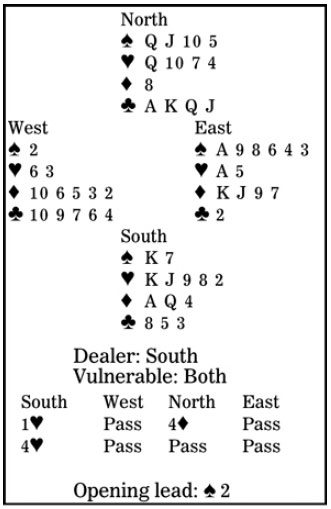

J. Michael Straczynski, who is best known as the creator of "Babylon 5", said, "We are in a tech-heavy society, plunging headlong into an unknown future. Science fiction is what allows you to stand back and analyze the impact of that and put it in context of how it affects people." There is no certainty that science-fiction writers correctly predict tech development. But occasionally bridge players plunge headlong down a path of declarer-play or defense, only to learn that they should have paused and calmly considered the situation.
How does that apply in this deal? South is in four hearts. West leads the spade two: five, ace, seven. What happens next? North responded with a splinter bid, showing four or more hearts, at least game-going values and a singleton (or void) in diamonds. East was tempted to intervene with four spades, but he would have been doubled by both opponents (!) and would have gone down four or five, minus 1,100 or 1,400. East knows his partner has led a singleton. So, there is a natural inclination to return a spade. Yes, partner ruffs and shifts to a minor, but declarer takes that trick and plays a trump. Then, though, when East wins and leads another spade, South ruffs high, draws the missing trump and claims. East needs to ask himself from where a fourth defensive trick can come. Then he might foresee a club ruff in his hand. At trick two, he shifts to his club. Declarer wins on the board and plays a trump, but East dashes in with his ace and leads the spade three. West ruffs and gives his partner the key club ruff to defeat the contract.